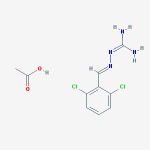- Type of Drug: Antihypertensive
- Prescribed for: High blood pressure
General Information
Guanabenz Acetate works by stimulating certain central- nervous-system receptors. This results in a general reduction of the level at which the nervous system is stimulated by the brain. The immediate blood-pressure lowering occurs without a major effect on blood vessels. However, chronic use of Guanabenz can result in widening of blood vessels and a slight slowing of the pulse rate. Guanabenz can be taken alone or together with a thiazide diuretic.
Cautions and Warnings
Do not take Guanabenz if you are sensitive or allergic to it.
Possible Side Effects
- Most common: drowsiness, sedation, dry mouth, dizziness, weakness, and headache.
- Less common: chest pains, swelling (in the hands, legs, or feet), heart palpitations or abnormal heart rhythms, stomach or abdominal pain or discomfort, nausea, diarrhea, vomiting, constipation, anxiety, poor muscle control, anxiety, depression, difficulty sleeping, stuffy nose, blurred vision, muscle aches and pains, difficulty breathing, frequent urination, male impotence, unusual taste in the mouth, and swollen and painful male breasts. Side effects are more common and more severe as your dose of Guanabenz increases.
Drug Interactions
• The effect of this drug is increased by taking it together with other blood-pressure-lowering agents. Its sedating effects are increased by taking it with tranquilizers, sleeping pills, or other nervous-system depressants, including alcohol.
• People taking this drug for high blood pressure should avoid nonprescription medicines that might aggravate hypertension (e.g., decongestants, cold and allergy remedies, and diet pills, all of which may contain stimulants). If you are unsure about which medicines to avoid, ask your pharmacist.
Food Interactions
This drug is best taken on an empty stomach, but it may be taken with food if it upsets your stomach.
Usual Dose
4 mg twice a day to start, with a gradual increase to a maximum of 32 mg twice a day (doses this large are rarely needed).
Overdosage
Guanabenz overdose will cause sleepiness, lethargy, low blood pressure, irritability, pinpointed pupils, and reduced heart rate. Overdose victims must be made to vomit with Syrup of Ipecac (available at any pharmacy) to remove any remaining drug from the stomach. Call your doctor or poison control center before doing this. If you must go to a hospital emergency room, ALWAYS bring the medicine bottle with you.
Special Information
Take this drug exactly as prescribed for maximum benefit. If any side effects become severe or intolerable, contact your doctor, who may need to reduce your daily dosage.
Guanabenz often causes tiredness or dizziness; avoid alcohol when taking this drug because it tends to increase these effects. Take care when driving or doing anything else that requires intense concentration.
Do not stop taking this medicine without your doctor’s approval. Suddenly stopping it can cause a rapid increase (or rebound) in blood pressure. The dosage must be gradually reduced by your doctor.
If you forget to take a dose of Guanabenz Acetate, take it as soon as you remember. If it is almost time for your next dose, skip the one you forgot and continue with your regular schedule. Do not take a double dose.
Call your doctor if you miss 2 or more consecutive doses.
Special Populations
Pregnancy/Breast-feeding
Reports of the effects of this drug in pregnant women have yielded conflicting results. Because it may adversely affect a developing baby, Guanabenz should be avoided by pregnant women and by those who may become pregnant while using it. When Guanabenz is deemed essential, its potential benefits must be carefully weighed against its risks.
Nursing mothers should bottle-feed their babies if they must take Guanabenz.
Seniors
Older adults are more sensitive to the sedating and blood- pressure-lowering effects of this drug. Follow your doctor’s directions, and report any side effects at once.

